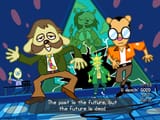Search Results
6/29/2025, 11:51:02 AM
> but this game is as close as I think it gets to a game being actual literature.
> Absolute literature or just me being a dumbass?
Depends on what you mean by that. Quality-wise, the writing is extremely hit-or-miss for me and it really depends on whether you think Kurviz trying to emulate the discussion style of Twitter/Tumblr in the CRPG medium was a good idea. If you've spent some time on the Internet and understand the type of people on Twitter this or that character is referencing, you're either gonna be delighted or have your immersion be thrown out. There's better writing and there's much worse writing out there. The setting is interesting enough.
The political side is a bit skewed here because the authors really want you to see that this current thing does not have a future and we can either see the future again through struggle and rave or be disintegrated by the past, but they also wanted to coat a lot of things in humor to be digestible, so sometimes it gets almost annoying and you just wanna go full DFW sweaty gorilla mode on the authors. It's largely a story about time, space and memories of various proportions being stained and haunted: Harry by his ex, Revachol by the failed revolution, Elysium by the figures in power stealing the future from the present. I liked my time with it, at least. There aren't many modern RPGs which are also modern in its text, which is commendable.
There are some interesting things in there, but they don't have to be "literature" to be worthy of analysis. Disco is a polycode text: a combination of language and other sign codes working together to deliver a message. Musicals are polycodes, AMVs are polycodes, ads are polycodes. Because there's just a lot more mixed media and people who have to do a study of anything to pass nowadays, more things can be subjected to a study.
I keep track of my university's academic life and Disco's been appearing in one way or another for several years now in student conferences and other things. I'm considering a PhD-like on temporal/spatial/memory anomalies as a narrative trick in modern English literature and Sacred and Terrible Air/Disco fit pretty well, so I've asked my university professor to send me a copy of some other guy's coursework she had oversight over on the construction of various types of spacetime in literary text using Disco as an example. It largely uses Harry speaking to the skills as an example of constructing psychological (Empathy) and geographical (Shivers) spacetime and has a surprisingly sturdy theoretical base which considers the mind of a literary character a spacetime of its own. It's a big thing to explain so you can read Mikhail Bakhtin to learn about the fundamentals of it.
> Absolute literature or just me being a dumbass?
Depends on what you mean by that. Quality-wise, the writing is extremely hit-or-miss for me and it really depends on whether you think Kurviz trying to emulate the discussion style of Twitter/Tumblr in the CRPG medium was a good idea. If you've spent some time on the Internet and understand the type of people on Twitter this or that character is referencing, you're either gonna be delighted or have your immersion be thrown out. There's better writing and there's much worse writing out there. The setting is interesting enough.
The political side is a bit skewed here because the authors really want you to see that this current thing does not have a future and we can either see the future again through struggle and rave or be disintegrated by the past, but they also wanted to coat a lot of things in humor to be digestible, so sometimes it gets almost annoying and you just wanna go full DFW sweaty gorilla mode on the authors. It's largely a story about time, space and memories of various proportions being stained and haunted: Harry by his ex, Revachol by the failed revolution, Elysium by the figures in power stealing the future from the present. I liked my time with it, at least. There aren't many modern RPGs which are also modern in its text, which is commendable.
There are some interesting things in there, but they don't have to be "literature" to be worthy of analysis. Disco is a polycode text: a combination of language and other sign codes working together to deliver a message. Musicals are polycodes, AMVs are polycodes, ads are polycodes. Because there's just a lot more mixed media and people who have to do a study of anything to pass nowadays, more things can be subjected to a study.
I keep track of my university's academic life and Disco's been appearing in one way or another for several years now in student conferences and other things. I'm considering a PhD-like on temporal/spatial/memory anomalies as a narrative trick in modern English literature and Sacred and Terrible Air/Disco fit pretty well, so I've asked my university professor to send me a copy of some other guy's coursework she had oversight over on the construction of various types of spacetime in literary text using Disco as an example. It largely uses Harry speaking to the skills as an example of constructing psychological (Empathy) and geographical (Shivers) spacetime and has a surprisingly sturdy theoretical base which considers the mind of a literary character a spacetime of its own. It's a big thing to explain so you can read Mikhail Bakhtin to learn about the fundamentals of it.
Page 1
